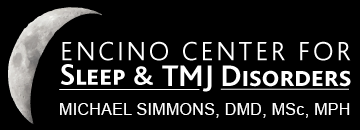What Are the Signs of Sleep Apnea During Pregnancy?
October 11, 2018
Loud snoring is usually what people associate sleep apnea with, but not all snorers have it. Partners have noted that the other partner sounds like they are choking or gasping breathlessly in their sleep.
Another sign of sleep apnea is waking up feeling restless and fatigued. This can be difficult to spot during pregnancy due to the natural stress on your body while carrying a child. If you find that you can’t regularly stay awake in the afternoons or dozing off while driving, then please contact Dr. Simmons today.
Other symptoms you may experience if you suffer from this sleeping condition include waking up with a headache or dry mouth, nighttime heartburn, and frequent urination. Evidently, these signs can also be associated with pregnancy, but if you’ve noticed these are ongoing patterns, it doesn’t hurt to contact our Encino sleep dentist with any questions or concerns.
How Sleep Apnea Affects Your Expected Child
Untreated sleep apnea during pregnancy has been found to be associated with gestational hypertension, diabetes, and unplanned Caesarean sections. It may also lead to fetal growth restrictions and prolonged labor. Women severely affected by sleep apnea may develop obesity hypoventilation syndrome, which happens when severely overweight people fail to breathe rapidly enough. This will result in low blood sugar levels and high blood carbon dioxide levels, which can be harmful to you and your baby.
Fortunately, we offer proper treatment plans that help increase your chances of having a healthy baby.
How to Treat Pregnancy-Related Sleep Apnea?
Treating sleep apnea is especially important during pregnancy due to the effects it has on the mother and fetus. The industry standard of treatment is known as Continuous Positive Airway Pressure (CPAP), but there are alternative options for those who can’t adjust to their CPAP machine.
One useful tip to help mitigate the adverse effects of sleep apnea while pregnant is to have the mother sleep on her side. This method of positional therapy will prevent her from snoring and lower the chances of her sleep apnea condition from arising.
According to the National Institute of Health, about half of the people with sleep apnea are overweight. If the patient is substantially bigger or is having twins (triplets, quadruplets, etc.), then the use of a BiPAP (Bilevel Positive Airway Pressure) machine may be more suitable. The pressure applied from these machines will need to be altered as the pregnancy progresses and weight is gained.
In extreme cases, the use of surgical procedures, such as a tracheostomy will be required in order to make sure the mother and child are getting the amount of oxygen they need. However, no kind of surgery is preferred as a treatment option because of the risk of adverse outcomes.
Sleep Better for You and Your Child
If you want to learn more about snoring and sleep apnea treatments appropriate during pregnancy, please call (818) 300-0070 for an appointment with our sleep dentist, Dr. Michael Simmons, at the Encino Center for Sleep & TMJ Disorders.
